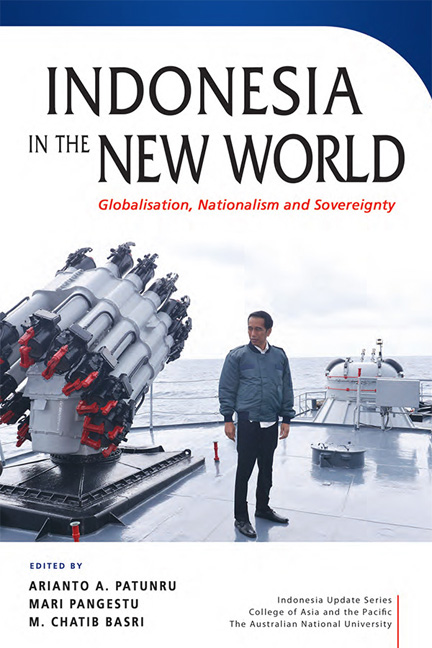Book contents
- Frontmatter
- Contents
- Tables
- Figures
- Contributor
- Acknowledgments
- Glossary
- 1 Challenges for Indonesia in the new world
- PART 1 Globalisation, Nationalism and Sovereignty: the Indonesian Experience
- 2 Challenging geography: asserting economic sovereignty in a porous archipelago
- 3 The new nationalism in Indonesia
- 4 Nationalism, sovereignty and foreign policy: Indonesia and the disputes over the South China Sea
- PART 2 Nationalism in Practice
- PART 3 Impact of and Response to Globalisation
- PART 4 The Human Face of Globalisation
- PART 5 Navigating The New Globalisation
- Index
- INDONESIA UPDATE SERIES
3 - The new nationalism in Indonesia
from PART 1 - Globalisation, Nationalism and Sovereignty: the Indonesian Experience
Published online by Cambridge University Press: 08 June 2019
- Frontmatter
- Contents
- Tables
- Figures
- Contributor
- Acknowledgments
- Glossary
- 1 Challenges for Indonesia in the new world
- PART 1 Globalisation, Nationalism and Sovereignty: the Indonesian Experience
- 2 Challenging geography: asserting economic sovereignty in a porous archipelago
- 3 The new nationalism in Indonesia
- 4 Nationalism, sovereignty and foreign policy: Indonesia and the disputes over the South China Sea
- PART 2 Nationalism in Practice
- PART 3 Impact of and Response to Globalisation
- PART 4 The Human Face of Globalisation
- PART 5 Navigating The New Globalisation
- Index
- INDONESIA UPDATE SERIES
Summary
Over the last decade or so, as Indonesia has recovered from the blows of the 1997–98 Asian financial crisis, resumed economic growth and sta¬bilised as a successful democracy, a mood of assertive nationalism has entered the country's public discourse and domestic politics. Politicians, intellectuals, journalists, leaders of religious and social organisations, and many ordinary citizens frequently state publicly that foreign countries habitually insult, exploit and mistreat Indonesia, and do not accord it the respect it deserves as a great nation. From time to time, there are angry eruptions of public protest and media condemnation in response to alleged insults that other countries—usually neighbours such as Malaysia or Australia—have directed in Indonesia's direction. Candidates for politi¬cal office increasingly draw upon nationalist themes, and political leaders are increasingly moulding public policy to match the nationalist mood, with a host of measures to protect sectors of the Indonesian economy and restrict activities by foreigners. Though nationalist discourse and policy-making have featured in all post-Suharto governments, they are becoming even more prominent under President Joko Widodo, sworn into office in October 2014.
This chapter sketches core features of this new nationalism, analy¬ses its historical roots and identifies the factors driving its contemporary manifestation. The first section introduces the new nationalism, noting three key arenas of nationalist mobilisation: territorial, economic and cultural. The second section explains the historical sweep of Indonesian nationalism, in order to identify both the roots of the contemporary phe-nomenon and its novel characteristics. The next two sections focus on two features that define the contemporary nationalism: first, a sense of suspicion, sometimes bordering on paranoia, about the allegedly hostile intentions harboured by foreign countries; and second, an obsession with insults allegedly directed at Indonesia, and an overwhelming concern to defend Indonesia's ‘national dignity’.
The final section of the chapter considers factors driving the new nationalism. Indonesia's post-1998 democratisation, and the absence of strong policy or ideological differences between its major parties, provides a domestic political context strongly conducive to nationalist outbidding. The new nationalism is also moulded by insecurity about Indonesia's place in the world. The emphasis on national dignity, for example, derives largely from the anxieties attending Indonesia's transformation from a relatively poor and underdeveloped nation into a more successful eco¬nomic player, but one that still lags behind neighbouring countries.
- Type
- Chapter
- Information
- Indonesia in the New WorldGlobalisation, Nationalism and Sovereignty, pp. 35 - 51Publisher: ISEAS–Yusof Ishak InstitutePrint publication year: 2018

